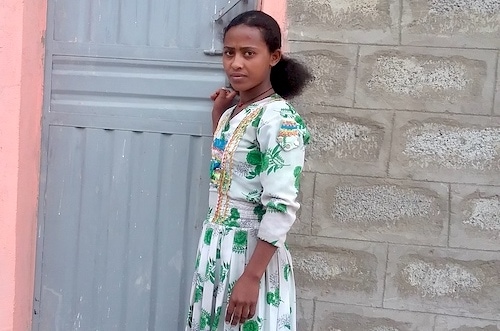Ethiopia is home to 15 million child brides. This is one of their stories.
Now a young adult woman, Adebar knows just how challenging it can be to escape the deep-rooted practice of child marriage in a community. Adebar is 21 years old and comes from a subsistence farming community in the Ethiopia. Currently, Adebar excels as a student and is first in her class. But Adebar’s journey to being an outstanding student hasn’t been without challenge. At only 11 years old, her parents forced her to marry a man much older than her. She still copes with the physical and psychological trauma of her life as a child bride — a life she regularly tried to escape by running away to her parents’ home, only to be returned to her husband and beaten.
Still, Adebar remained committed to escaping the marriage. She eventually turned to the only person in her family who wouldn’t shame her for wanting to escape: her uncle. With her uncle’s help, Adebar finally ended the marriage after surviving four years of abuse.
Two years later, however, when Adebar was 17, her parents began arranging her second marriage against her wishes. By this time, Adebar had heard about the Her Choice program from her peers and reached out to her school’s Her Choice contact. The local Her Choice staff member took the time to meet with Adebar, her family and her potential husband’s family. Through multiple sessions at their homes and at Adebar’s school, they learned about the long term negative health outcomes and legal repercussions of child marriage and the wedding was swiftly called off.
Thanks to Her Choice program, Adebar aims to become a Women’s Rights advocate by attending university and studying law.
“The innovative project supported me with academic materials, psychological and key sexual and reproductive health rights support that paved the way for me to return to school. Now I have a comprehensive understanding of child marriage/female genital mutilation and hurtful practices, because of the training program in the local school. I have quickly become a change agent of key SRHR issues, child marriage and girls’ education. As an active member of the girls’ club, I produce and use handmade sanitary materials (pants, pads, and face masks) and share my experience in community gatherings and rallies.”
-Adebar
Not all girls are able to access an advocate through networks like Her Choice. And, instead of realizing the full potential of their lives through education, they enter a cycle of generational hunger. When they are young, these girls are perceived as less valuable and are fed last and least. These chronically malnourished girls are then denied opportunity to an education or agency over their own bodies and, like Adebar, are forced to marry young. Most then give birth long before their bodies have fully developed. Their children, in turn, are stunted by the malnourishment of their young mothers. And, if they are girl babies, they are fed last and least. In this way, the cycle of hunger continues and worsens.
To break this cycle, programs like Her Choice, a coalition of organizations including The Hunger Project, change mindsets and dismantle the systems that perpetuate hunger. To break this cycle, we must invest in girls.
What we do.
Girls who live in rural areas, come from low-income families or have little to no education run a higher risk or becoming child brides. Child marriage can negatively affect a girl’s development by leading to early pregnancy, social isolation, interrupting schooling, limiting career advancement opportunities and increasing the risk of domestic violence. We partner with volunteers or “animators” who run awareness campaigns to put an end to violence against girls and discriminatory practices like child marriage, dowry and female genital mutilation.

